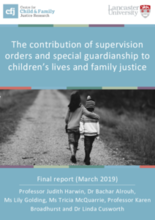Displaying 641 - 650 of 1177
This study uses a qualitative approach to explore the experiences of 22 UK foster carers when a child is ‘moved on’ from a placement, focusing specifically on their experiences of loss.
As agencies consider how to build the capacity of carers to support unaccompanied young people, this study set out to learn from the experiences and views of foster carers, in order to inform the development of effective carer training and support.
This article follows on from ‘How children in foster care engage with loyalty conflict: presenting a model of processes informing loyalty’ (Dansey, John and Shbero, 2018), published in the previous edition of this journal.
This article presents a preliminary exploration of the participation in a mindfulness-based group therapy by nine looked after children aged 14 to 17.
This report outlines the barriers to settlement demonstrated by the work CCLC has done with children and young people and makes recommendations for the ways in which the government can ensure that these barriers can be overcome as the EU settlement scheme is rolled out.
The UK Home Office is introducing a new scheme requiring the registration of EU nationals after Brexit, putting children in care and other vulnerable children in danger of slipping through the cracks, according to a report from Coram Children’s Legal Centre.
This paper draws on an evaluation of the effectiveness of the Nurturing Attachments groupwork programme provided by AdoptionPlus for adoptive families in England. The Nurturing Attachments programme, informed by Dyadic Developmental Psychotherapy (Hughes, Golding & Hudson, 2015), was developed to help foster and adoptive parents strengthen their relationships with the child and support children who had experienced developmental traumas.
The Spring conference will focus on home, connection and felt security.
This paper reports on a qualitative study that aimed to understand children’s experiences of private fostering and social work practice.
This report is about the use of ‘family orders’ to support family reunification and placement with family and friends as outcomes of S31 care and supervision proceedings brought under the UK Children Act 1989. The over-arching aim of this study is to understand the opportunities, challenges and outcomes of these orders, and their use at national and regional level.


